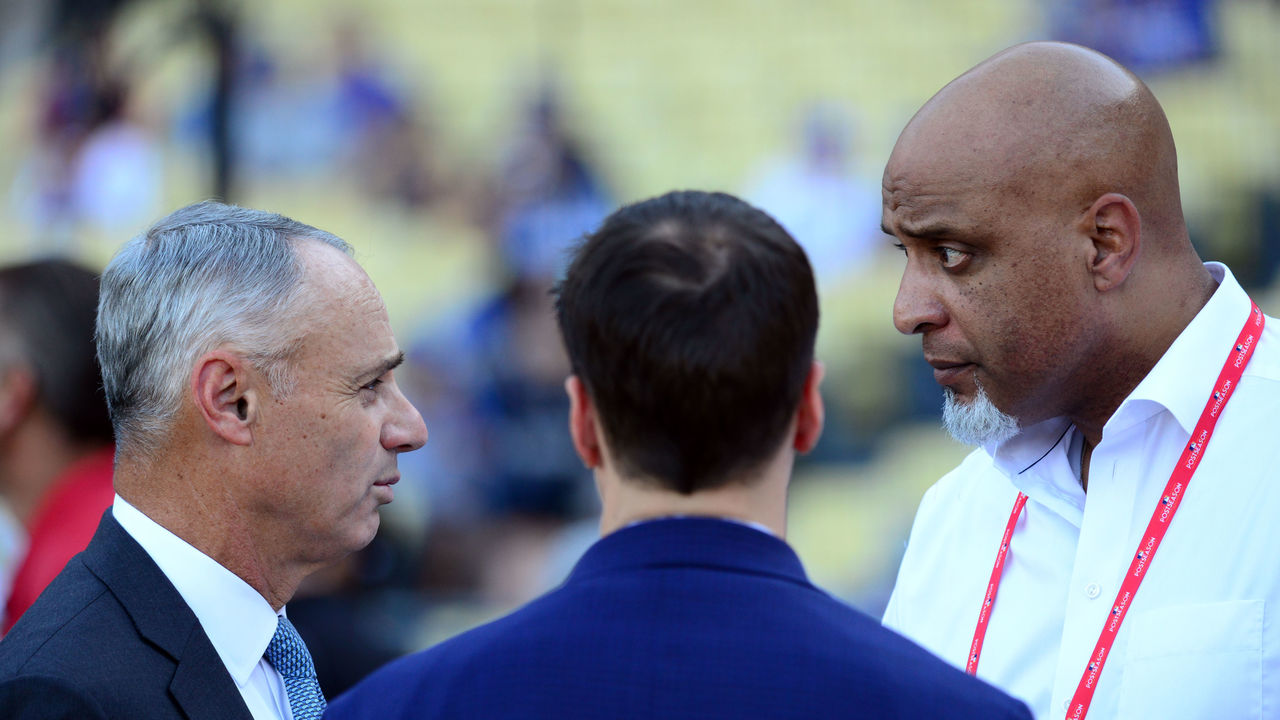The owners are caving, and there's (probably) going to be baseball in 2020
Throughout the "disaster" - as commissioner Rob Manfred put it - of the return-to-play negotiations between Major League Baseball and the MLBPA, the players were unequivocal about what they needed in order to play baseball in the midst of a pandemic: the prorated salaries promised to them in March, shortly after the coronavirus deferred the start of the 2020 season and upended the American economy.
And throughout this disaster, as baseball fans eventually watched both the NBA and NHL broker return-to-play plans, baseball's owners - unwilling to ostensibly take a financial hit after 17 consecutive years of record revenues and skyrocketing franchise valuations - were determined not to give in to players under the pretext that the March agreement gave them the right to renegotiate player salaries in the event fans weren't allowed to attend games in 2020. It didn't. The owners acknowledged as much.
Eventually, owing to the great power imbalance between the owners, a cabal of billionaires, and the players, a much more economically diverse group devoid of billionaires, it seemed the players had to cave. Their collective window to make money in the sport is finite and brief. At the risk of generalizing, the 26th man on every big-league roster needs that prorated $250,000 he would've earned in 2020. Bill DeWitt, who bought the Cardinals in 1995 and has since watched his personal net worth balloon to $4 billion, needs nothing.
Moreover, such an outcome seemed assured because the players always get screwed. Screwed by the reserve clause. Screwed by collusion. Screwed by service-time manipulation. Screwed by the luxury tax. Screwed by the qualifying offer. Screwed by declining salaries in the face of expanding revenues. And in this instance, with minimal leverage and public pressure to get back to work mounting disproportionately on them, the players seemed destined to acquiesce to a raw deal here, too, setting a dangerous precedent in which they're responsible for absorbing the owners' financial losses in the future.
But they didn't. Instead, the players held tough and negotiated a resumption of play in good faith, knowing full well their legal right to full prorated salaries. From the look of it, their approach worked.
Now, in a shocking twist, the owners are caving, conceding to the players' one non-negotiable demand on Wednesday for the first time in this disastrous process and creating hope for a 2020 season just days after the commissioner said he wasn't confident there would be baseball this year.
On Wednesday, Manfred met with MLBPA head Tony Clark in Arizona, where the two agreed to a framework "that could form the basis of an agreement," as Manfred said in a statement. That framework includes an expanded postseason, a universal DH, and, most importantly, full prorated salaries. A deal isn't done yet - the union wants to play more than 60 games - but the owners' newfound willingness to honor the pro rata agreement makes a season seem probable. If a deal gets done, it amounts to a resounding coup for the players, who watched their bosses squander their leverage and play themselves into a position where they had to concede.
From the outset of negotiations, the owners - confident the players would kowtow if they went long enough without a paycheck - were determined not to negotiate, and ultimately offered the same deal over and over, adjusting the number of games played and the payout percentages without ever substantively increasing the total amount of money to be paid or meeting the obligation of full prorated salaries.
Meanwhile, the players' resolve hardened. After receiving a third, virtually identical offer from the owners, the players - who made legitimate counterproposals that demonstrated a willingness to compromise, going from a 114-game proposal with full prorated salaries to an 89-game season with potential deferrals in the event of a canceled postseason - walked away from the table entirely. As a result, they effectively dared Manfred to unilaterally impose a dramatically shortened season, a right afforded to him in that March agreement so long as players were paid their full prorated salaries.

But he couldn't. Forcing a farcically short season upon the players would've opened the owners up to a grievance, one they grew convinced they would lose because of their bad-faith machinations. The resultant damages to be paid out to the players would've been hefty, far greater than the additional salary money the players had been asking for in 2020. Manfred, as such, had no choice but to re-engage with the union and work in earnest toward an agreement, which meant paying the players their full prorated salaries.
Now, barring a breakdown in what should be late-stage negotiations, they'll get them. Well, so long as the still-raging pandemic doesn't kibosh the season altogether. (Cases of COVID-19 spiked this week in Arizona, California, Florida, and Texas, which are home to 10 of the league's 30 teams.)
In any event, the players earned a massive moral victory by refusing to waver and are poised to snap the owners' recent winning streak in these matters by demanding to be fairly compensated, remaining united throughout, and refusing to negotiate with those who intend only to waste time. Hopefully, they take a similarly militant approach in the upcoming CBA negotiations a year and a half from now.
The players won't be screwed over in 2020. They said that from the beginning. The owners have finally accepted it.
Now let's get a deal done.
Jonah Birenbaum is theScore's senior MLB writer. He steams a good ham. You can find him on Twitter @birenball.